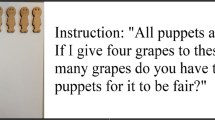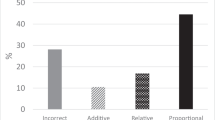Abstract
This paper presents a review of the research on proportional reasoning. Methodologies used in proportional reasoning studies are presented first. The discussion is then organized around the following topics: strategies use to solve proportion problems, including erroneous strategies; factors that influence performance on proportion problems, both task-related and subject-related; training studies. The discussion is accompanied by suggestions for educational and research applications.
Similar content being viewed by others
References
Adi H. and Pulos S.: 1980, ‘Individual differences and formal operational performance of college students’,Journal for Research in Mathematics Education 11(2), 150–156.
Anderson, L. H.: 1979,Development Effects in Learning Hierarchy Structure for Problems Involving Proportional Reasoning, unpublished doctoral dissertation, University of California, Berkeley.
Bart W. M.: 1972, ‘Construction and validation of formal reasoning instruments’,Psychological Reports 30, 663–670.
Biemiller, A.: 1981,A Neo-piagetian Approach to Development During the Formal-operational Period, paper presented at the Eleventh Annual International Conference on Piagetian Theory and its Implications for the Helping Professions, University of Southern California, Los Angeles.
Brendzel, S: 1980,Proportional Reasoning and Visual Spatial Ability, paper presented at the annual meeting of the National Association for Research in Science Teaching, Boston, Mass.
Capon N and Kuhn K.: 1979, ‘Logical reasoning in the supermarket: Adult females' use of a proportional strategy in an everyday context’,Developmental Psychology,15(4), 450–452;6, 544–573.
Case R.: 1978, ‘Piaget and beyond: Toward a developmentally based theory and technology of instruction’, in R. Glaser (ed.),Advances in Instructional Psychology, LEA, Hillsdale, New Jersey.
Case R.: 1979, ‘Intellectual development and instruction: a neo-Piagetian view’, in A. Lawson (ed.),The Psychology of Teaching for Thinking and Creativity, ERIC, Columbus, Ohio.
Case R.: 1980, ‘Implications of neo-piagetian theory for improving the design of instruction’, in J. R. Kirby and J. B. Biggs (eds),Cognitive Development and Instruction, Academic Press, New York.
Cloutier R and Goldschmid M. L.: 1976, ‘Individual differences in the development of formal reasoning’,Child Development 47, 1097–1102.
Cloutier R. and Goldschmid M. L.: 1978, ‘Training proportionality through peer instruction’,Instructional Science 7, 127–142.
Falk, R.: 1978,Analysis of the Concept of Probability in Young Children, paper presented at the Second Conference of IGPME.
Fischbein E., Pampu I., and Manzat I.: 1970, ‘Comparison of ratios and the chance concept in children’,Child Dvelopment 41, 377–389.
Furman, I.: 1981,The Development of Problem-solving Strategies: A Neo-piagetian Analysis of Children's Performance in a Balance Task, unpublished doctoral dissertation, University of California, Berkeley.
Gold, A. P.: 1978,Cumulative Learning Versus Cognitive Development: A Comparison of Two Different Theoretical Bases for Planning Remedial Instruction in Arithmetic, unpublished doctoral dissertation, University of California, Berkeley.
Hart K. M.: 1981,Children's Understanding of Mathematics: 11–16, John Murray Ltd., London.
Horn J. L.: 1982, ‘The ageing of human abilities’, in B. Wolman (ed.),Handbook of Developmental Psychology, Prentice-Hall, Englewood Cliffs, New Jersey.
Horowitz, L.: 1982,Visualization and Arithmetic Problem Solving, paper presented at the annual meeting of the American Educational Research Association, Los Angeles.
Inhelder B. and Piaget J.: 1958,The Growth of Logical Thinking from Childhood to Adolescence, Basic Books, New York.
Jackson S.: 1965, ‘The growth of logical thinking in normal and subnormal children’,British Journal of Educational Psychology 35, 225–258.
Joyce L. K.: 1977, ‘A study of formal reasoning in elementary education majors’,Science Education 61(2), 153–158.
Juraschek W. A. and Grady M. T.: 1981, ‘Format variations on equilibrium in the balance’,Journal of Research in Science Teaching 18(1), 47–49.
Karplus R.: 1981, ‘Education and formal thought: A modest proposal’, in E. Siegel (ed.),New Directions in Piagetian Theory and Practice, Lawrence Erlbaum Associates, Hillsdale N.J.
Karplus R., Karplus E., Formisano M., and Paulsen A.: 1979, ‘Proportional reasoning and control of variables in seven countries’, in J. Lochheed and J. Clement (eds.),Cognitive Process Instruction, The Franklin Institute Press, Philadelphia.
Karplus R., Karplus E., and Wollman W.: 1974, ‘Intellectual development beyond elementary school. IV: Ratio, the influence of cognitive style’,School Science and Mathematics 74(6), 476–482.
Karplus, R., Pulos, S., and Stage, E. K.: 1981,Proportional Reasoning in Early Adolescents: Comparison and Missing Value Problems in Three Schools, paper presented at the Third Annual Conference for the Psychology of Mathematics Education, Minneapolis, Minnesota.
Karplus R., Pulos S., and Stage E. K.: 1983a, ‘Proportional reasoning of early adolescents’, in R. Lesh and M. Landau (eds.),Acquisition of Mathematics Concepts and Processes, Academic Press, New York.
Karplus R., Pulos S., and Stage E. K.: 1983b, ‘Early adolescents' proportional reasoning on “rate” problems’,Educational Studies in Mathematics 14, 219–233.
Karplus, R., Pulos, S., and Stage, E. K.: in press, ‘A study of early adolescents' mathematical reasoning’,Journal of Mathematical Behavior.
Kieren T. E. and Nelson D.: 1978, ‘The operator construct of rational numbers in childhood and adolescence—an exploratory study’,The Alberta Journal of Educational Research 24(1), 22–30.
Kieren T. E. and Southwell B.: 1979, ‘The development in children and adolescents of the construct of rational numbers as operators’,The Alberta Journal of Educational Research 25(4), 234–247.
Kurtz B. and Karplus R.: 1979, ‘Intellectual development beyond elementary school. VII: Teaching for proportional reasoning’,School Science and Mathematics 79(4), 387–289.
Lawson A. E.: 1977, ‘Relationships among performances on three formal operations tasks’,Journal of Psychology 96, 235–241.
Lawson A. E.: 1979, ‘Relationships among performances on group-administered items of formal reasoning’,Perceptual and Motor Skills 48, 71–78.
Lawson A. E.: 1982, ‘Formal reasoning, achievement, and intelligence: an issue of importance’,Science Education 66(1), 77–83.
Lawson A. E. and Nordland F. H.: 1976, ‘Factor structure of some Piagetian tasks’,Journal of Research in Science Teaching 13(5), 461–466.
Lawson, W. E. and Wollman, W. T.: 1975,Teaching Proportions and Intellectual Development—an experiment, AESOP Report No. ID-30, Lawrence Hall of Science.
Lawson A. E. and Wollman W. T.: 1977, ‘Cognitive level, cognitive style, and value judgement’,Science Education 61(3), 397–407.
Linn M. C. and Pulos S.: 1983, ‘Aptitude and experience influences on proportional reasoning during adolescence: focus on male-female differences’,Journal for Research in Mathematics Education 14(1), 30–46.
Linn M. C. and SwineyJr J. F.: 1981, ‘Individual differences in formal thought’,Journal of Educational Psychology 73(2), 274–286.
Lovell K.: 1961, ‘A follow-up study on Inhelder and Piaget's the Growth of Logical Thinking’,British Journal of Psychology 52(2), 143–153.
Martorano S. C.: 1977, ‘A developmental analysis of performance on Piaget's formal operations tasks’,Developmental Psychology 13(6), 666–672.
Newton, R., Copie, W., and Tobin, K. G.: 1981,Patterns of reasoning: Proportional Reasoning, paper presented at the annual meeting of the National Association for Research in Science Teaching, Grossinger, New York.
Noelting, G.: 1975,Stages and Mechanisms in the Development of Proportions in the Child and Adolescent, paper presented at the Fifth Interdisciplinary Seminar on Piagetian Theory and its Implications for the Helping Professions, University of Southern California, Los Angeles.
Noelting G.: 1980a, ‘The development of proportional reasoning and the ratio concept: Part I—Differentiation of stages’,Educational Studies in Mathematics 11, 217–253.
Noelting G.: 1980b, ‘The development of proportional reasoning and the ratio concept: Part 11—Problem structure at successive stages; problem solving strategies and the mechanism of adaptive restructuring’,Educational Studies in Mathematics 11, 331–363.
Pallrand G. J.: 1977,The Development of Formal Thought, National Association for Research in Science Teaching, Cincinnati, Ohio.
Pallrand G. J.: 1979, ‘The transition to formal thought’,Journal of Research in Science Teaching 16(5), 445–451.
Pascual-Leone J., Goodman D., Ammon P., and Subleman I.: 1978, ‘Piagetian theory and neo-Piagetian analysis as psychological guides in education’, in J. M. Gallagher and J. A. Easley (eds.),Knowledge and Development, Vol. 2, Plenum, New York.
Piaget J., Grize J. B., Szeminska A., and Vinh Bang: 1968,Epistémologie et Psychologie de la Fonction, Presses Universitaires de France, Paris.
Piaget J. and Inhelder B.: 1951,La Genèse de l'idée de hasard chez l'enfant, Presses Universitaires de France, Paris.
Pitt, R. B. and Brouwer-janse, M.: 1981,Proportional Reasoning in Adolescents and Adults. Paper presented at the Society for Research in Child Development Biennal Meeting, Boston, Mass.
Pulos S., Karplus R., and Stage E. K.: 1981, ‘Generality of proportional reasoning in early adolescents: Content effects and individual differences’,Journal of Early Adolescence 1, 257–264.
Pulos, S., Stage, E. K., and Karplus, R.: 1980, ‘Cognitive correlates of proportional reasoning in early adolescence’,Proceedings of the 4th International Conference for the Psychology of Mathematics Education, 143–149.
Pulos S., Stage E. K., and Karplus R.: 1982, ‘Setting effects in mathematical reasoning of early adolescents’,Journal of Early Adolescence 2(1), 39–60.
Quintero, A. H. and Schwartz, J. L.: 1982,The Development of the Concept of Ratio in Children, DBRE Working Paper Series (WP-15).
de Ribaupierre A., and Pascual-Leone J.: 1979, ‘Formal operations andM-power: A neo-Piagetian investigation’, in D. Kuhn (ed.),Intellectual Development Beyond Childhood, Jossey-Bass, San Francisco.
Ricco G.: 1982, ‘Les première acquisitions de la notion de fonction linèaire chez l'enfant de 7 à 11 ans,’Educational Studies in Mathematics 13(3), 289–327.
Riebman, B. and Overton, W.: 1977,Reflection-impulsivity and the Utilization of Formal Operational Thought, paper presented at the biennal meeting of the Society for Research in Child Development, New Orleans.
Roberge J. J. and Flexer B. K.: 1979, ‘Further examination of formal operational reasoning abilities’,Child Development 50, 478–484.
Ross R. J.: 1973, ‘Some empirical parameters of formal thinking’,Journal of Youth and Adolescence 2(2), 167–177.
Rupley, W. H.: 1981,The Effects of Numerical Characteristics on the Difficulty of Proportional Problems. Unpublished doctoral dissertation, University of California, Berkeley.
Siegler R. S.: 1976, ‘Three aspects of cognitive development’,Cognitive Psychology 8, 481–520.
Siegler R. S.: 1978, ‘The origins of scientific reasoning’, in R. S. Siegler (ed.),Children's thinking: What develops? Lawrence Erlbaum Associates, Hillsdale, N.J.
Stage, E. K. Karplus, R., and Pulos, S.: 1980, ‘Social content of early adolescents' proportional reasoning’,Proceedings of the 4th International Conference for the Psychology of Mathematics Education, 150–157.
Tourniaire, F.: 1984,Proportional Reasoning in Grades Three, Four and Five, Unpublished doctoral dissertation, University of California, Berkeley.
Van den Brink, J.: 1978,Young Children (6–8): Ratio and Proportion, paper presented at the Second Conference of IGPME.
Vergnaud G.: 1979, ‘The acquisition of arithmetical concepts’,Educational Studies in Mathematics 10, 263–274.
Vergnaud G.: 1980, ‘Didactics and acquisition of multiplicative structures in secondary schools’, in W. F. Archenbold, R. H. Driver, A. Orton, and G. Wood-Robinson (eds.),Cognitive Development Research in Science and Mathematics, The University of Leeds, Leeds, England.
Vergnaud G.: 1983, ‘Multiplicative structures’, in R. Lesh and M. Landau (eds.),Acquisition of Mathematics Concepts and Processes, Academic Press, New York.
Wersan, N.: 1981,Utilizing a Self-generated Visual Art Strategy to Facilitate Proportional Problem Solving in Mathematics, Unpublished doctoral dissertation, Rutgers University.
Wilkening F and Anderson N. H.: 1982, ‘Comparison of two rule assessment methodologies for studying cognitive development and knowledge structure’,Psychological Bulletin 92(1), 215–237.
Witken H. A. and Goodenough D. R.: 1981,Cognitive Style: Essence and Origins, International Universities Press, New York.
Wollman W. and Lawson A. E.: 1978, ‘The influence of instruction on proportional reasoning in seventh graders’,Journal of Research in Science Teaching 15(3), 227–232.
Wozny, C. D. and Cox, D. L.: 1975,The Effects of Task Differences on the Assessment of Formal Operational Thinking, Paper presented at the annual meeting of the American Educational Research Association, Washington, D.C.
Author information
Authors and Affiliations
Additional information
This paper was supported by the National Science Foundation Grant No. SED 79-18962. Any opinions, findings and conclusions expressed in this report are those of the authors and do not necessarily reflect the views of the National Science Foundation. The authors would like to express their appreciation to Elizabeth K. Stage and Joan Heller for comments on an earlier draft of this paper.
Rights and permissions
About this article
Cite this article
Tourniaire, F., Pulos, S. Proportional reasoning: A review of the literature. Educ Stud Math 16, 181–204 (1985). https://doi.org/10.1007/PL00020739
Issue Date:
DOI: https://doi.org/10.1007/PL00020739




